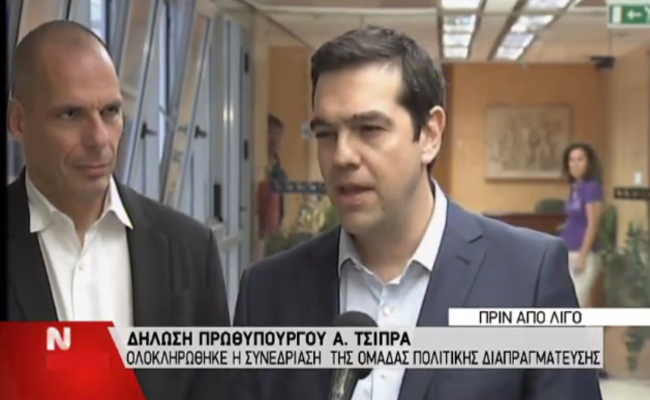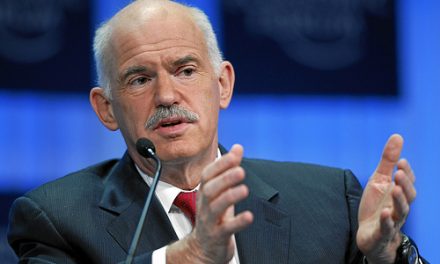By LIZ ALDERMAN, NIKI KITSANTONIS and JACK EWING, New York Times
ATHENS — As the Greek government faces a looming debt payment, top European leaders met in Berlin on Monday night to reach a consensus over what to do about Greece, signaling the urgent need to unlock emergency financing for the cash-starved country and avoid a devastating default.
But a growing political backlash in Greece adds to the uncertainty about whether a deal can be sealed. Prime Minister Alexis Tsipras faces increasing dissent within his leftist Syriza party over creditors’ demands for austerity terms as a condition for releasing the aid.
Greece’s main creditors — the International Monetary Fund, the European Central Bank and eurozone countries — have refused to release 7.2 billion euros in bailout funds until Athens agrees to a series of economic reforms and spending cuts. They have been at an impasse for months.
But the unexpected gathering of top representatives of the creditors is an urgent bid to move the talks forward. The assembly included Chancellor Angela Merkel of Germany; President François Hollande of France; Jean-Claude Juncker, president of the European Commission; Christine Lagarde, the I.M.F. managing director; and Mario Draghi, president of the E.C.B.The leaders discussed how Greece could meet its obligations in June but also make a series of large payments during the summer, said a person with knowledge of the discussions. An extension of the current aid program is one option. The creditors did not comment publicly on the meeting.
Ms. Merkel and the other leaders will avoid presenting anything to Greece that looks like an ultimatum, the person said. But they are likely to formulate what will amount to a last, best offer, with limited scope for negotiation. They may also present Greece with a deadline to provide an answer, though it was not certain when the deadline would be, the person said.
Unless they strike an agreement soon, Greece may not be able to make a series of coming debt payments. On Friday, Greece must make a €300 million loan repayment to the International Monetary Fund, and it owes €1.2 billion later this month.
Should a deal be signed this week and the cash made available, Greece should be able to survive financially through the summer, according to people involved in the discussions, who were not authorized to speak publicly. But Mr. Tsipras would still face an even steeper political challenge at home when its current €240 billion bailout deal expires at the end of this month.
Because Greece owes tens of billions of euros more to its creditors, Athens will probably need to consider applying for a third bailout package, estimated at €30 billion to €50 billion, in the fall. Any new aid would most likely be conditioned on further budget-cutting and revenue-raising requirements that Syriza might find hard to accept.
Far-left Syriza lawmakers have become increasingly agitated recently, accusing Mr. Tsipras of making too many compromises on the anti-austerity pledges that helped sweep the party to power in January’s elections.
A new political uproar broke when a group of Syriza lawmakers refused to back the government’s nominee for a new representative at the International Monetary Fund, Elena Panaritis, a former Greek parliamentarian who once worked at the World Bank. In a letter on Sunday, more than 40 Syriza members, mostly lawmakers, took issue with her support of Greece’s last international bailout agreement in 2012, which the party considered to have been unfair and overly harsh. Ms. Panaritis withdrew from consideration on Monday, citing the opposition.
Although symbolic, it was the latest in a series of uprisings within Syriza, which during the election campaign had promised to take a hard line with Greece’s creditors in debt negotiations and to resist austerity measures. A hard-left faction recently pressed for but lost an internal central committee party vote to have Athens stop paying its creditors altogether if they demanded further austerity.Mr. Tsipras is facing an array of pressures as critics from both the left and right in the Greek government question whether he has a viable plan to restart the economy, which slid back into a recession in the first quarter. At the same time, Greece’s creditors, the I.M.F. in particular, have resisted unlocking any aid unless the government can show that it will put its finances on a sound footing and run enough of an operating surplus to make regular debt payments.
The dispute over Ms. Panaritis on Monday “shows that there’s a lot of exasperation in Syriza ahead of a deal with creditors,” said Harry Papasotiriou, a professor of political science at the Panteion University in Athens and the head of the Institute of International Relations.
Even if dissent within Syriza deepens, the government would probably band together to push through any legislation needed to secure the bailout funds. Few lawmakers want to precipitate a default or force Greece to exit the currency union. But the hard-liners of Mr. Tsipras’s party could eventually break away, analysts said, especially the Left Platform, a faction that has already pushed for Greece to stop paying its creditors if they continue with “blackmailing tactics.”
Negotiations over the current bailout have been dragging on since February, as Mr. Tsipras has resisted measures that he said would worsen hardship for the Greek people, including heavier pension cuts and an increased consumption tax. Despite rumors on Monday that an “interim deal” aimed at securing crucial loans to Greece was imminent, European officials indicated that there was still some way to go before an agreement could be sealed.
“Progress has been made but we are not yet there,” Mina Andreeva, a spokeswoman for the European Commission, said Monday.
In a bid to placate his domestic audience, Mr. Tsipras lashed out at the slowness of the talks in an op-ed piece in the French daily newspaper Le Monde that was published over the weekend. He put the onus for an agreement on Greece’s creditors and blamed the lack of an deal on their insistence on “absurd proposals” and a “total indifference” to the anti-austerity mandate that he said the nation handed him in January.
The talks have stuck on several points. Both sides have varying forecasts for the country’s primary budget surplus, which is the amount of money the government can draw on to make debt payments after meeting its operating expenses. Greece wants to limit budget cuts and set the primary surplus below 1 percent, compared with an original target of 3 percent for this year.
Opinions also differ on how the value-added tax system should be changed to lift revenue. Overhauling the pension system and labor laws remain contentious issues; Mr. Tsipras indicated in the op-ed that Greece already had made concessions in those areas.
In the meantime, Greece’s finances continue to deteriorate as deepening political uncertainty accelerates a decline in tax receipts and withdrawals of deposits from the nation’s banks. Last week, Greece’s central bank reported that deposits fell in April to €133 billion, the lowest level in a decade, after savers withdrew nearly €5 billion from the banks during the month. More than €30 billion was withdrawn between the end of last November and the end of April, according to the Bank of Greece.


















